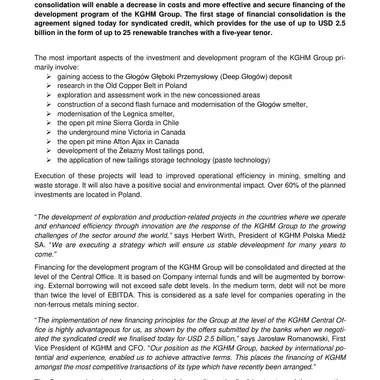Financial consolidation of investments by the KGHM Group
KGHM is consolidating its debt and strengthening its control over the financing of strategic development investments at the level of the KGHM Polska Miedź SA. Central Office. Such consolidation will enable a decrease in costs and more effective and secure financing of the development program of the KGHM Group. The first stage of financial consolidation is the agreement signed today for syndicated credit, which provides for the use of up to USD 2.5 billion in the form of up to 25 renewable tranches with a five-year tenor.
The most important aspects of the investment and development program of the KGHM Group pri-marily involve:
- gaining access to the Głogów Głęboki Przemysłowy (Deep Głogów) deposit
- research in the Old Copper Belt in Poland
- exploration and assessment work in the new concessioned areas
- construction of a second flash furnace and modernisation of the Głogów smelter,
- modernisation of the Legnica smelter,
- the open pit mine Sierra Gorda in Chile
- the underground mine Victoria in Canada
- the open pit mine Afton Ajax in Canada
- development of the Żelazny Most tailings pond,
- the application of new tailings storage technology (paste technology)
Execution of these projects will lead to improved operational efficiency in mining, smelting and waste storage. It will also have a positive social and environmental impact. Over 60% of the planned investments are located in Poland.
“The development of exploration and production-related projects in the countries where we operate and enhanced efficiency through innovation are the response of the KGHM Group to the growing challenges of the sector around the world,” says Herbert Wirth, President of KGHM Polska Miedź SA. “We are executing a strategy which will ensure us stable develeopment for many years to come.”
Financing for the development program of the KGHM Group will be consolidated and directed at the level of the Central Office. It is based on Company internal funds and will be augmented by borrow-ing. External borrowing will not exceed safe debt levels. In the medium term, debt will not be more than twice the level of EBITDA. This is considered as a safe level for companies operating in the non-ferrous metals mining sector.
“The implementation of new financing principles for the Group at the level of the KGHM Central Of-fice is highly advantageous for us, as shown by the offers submitted by the banks when we negoti-ated the syndicated credit we finalised today for USD 2.5 billion,” says Jarosław Romanowski, First Vice President of KGHM and CFO. “Our position as the KGHM Group, backed by international po-tential and experience, enabled us to achieve attractive terms. This places the financing of KGHM amongst the most competitive transactions of its type which have recently been arranged.”
The Company plans to make gradual use of the credit, as the flexible structure of the transaction provides the opportunity to make multiple drawdowns and repayment of credit trances depending on the existing liquidity needs of the KGHM Group. The credit was granted by a syndicate of banks, amongst whom are the largest Polish banks (including PKO BP, BGK Pekao SA, BZ WBK, Bank Handlowy and mBank) as well as banks from Europe, Canada, the USA and Japan which until now have worked with KGHM. The credit granted will be used for the above-mentioned investments by the KGHM Group and for refinancing of the debt of KGHM International. Over the next five years the refinancing operation (USD 700 million) will bring substantial savings in finance servicing costs, and will enable the release of a credit facility established on the assets of KGHM International and the elimination of restrictive financial and non-financial obligations limiting its development.
KGHM is currently involved in negotiations for a loan from the European Investment Bank. The EIB is an international, non-commercial institution of the European Union, which finances projects pro-moting regional development, are environmentally friendly and which promote innovative solutions and safer and better working conditions.



